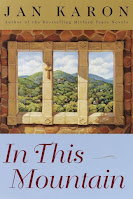 |
| (Amazon UK link) |
Tim is finding his retirement rather tedious. After a lifetime of ministering to local people, with weekly sermons and pastoral visits, he feels somewhat at a loose end for much of his time. His wife is busy writing and illustrating children's books, and has been invited on a tour of the country after winning a prestigious award; Tim wants to do something meaningful and fulfilling. So after much prayer and discussion they arrange to spend a year working for a mission in Tennessee, helping disadvantaged children.
All is going well with their preparations, although the letters from the team already in Tennessee are a little worrying in an amusing way, describing as they do the appalling conditions in which Tim and Cynthia will be expected to live and work! But nobody in Mitford wants them to leave, and Tim is feeling increasingly unwell. He suffers from diabetes, and is supposed to monitor his sugar-levels carefully as well as taking regular exercise - but he hasn't been doing so, and inevitably a crisis occurs.
The rest of the book deals with Tim coming through the crisis and the resultant depression, which brings back some painful memories from his childhood. However it's not as heavy as it sounds; the book also follows the lives of various of the Mitford residents. At times it feels a little in the style of an English village novel, with a fair amount of humour.
It took a while for me to get into this book. I've read all the others in the series, but didn't re-read them prior to starting this one, so I came to it afresh. The style is typically modern American with lots of short dialogue sections, and an informal style that I found slightly jarring at first, although I got used to it after a few chapters.
I wasn't entirely sure what to expect. Previous novels in the series introduced Father Tim as a long-term bachelor, then showed him falling in love with his neighbour and getting married in his sixties. Later books watched him take his retirement after fighting the idea for many years. By the time this one starts, he and Cynthia are living in comfort in the house that used to belong to her, and are taking an active part in the daily life of Mitford. Tim is seventy, but feels considerably younger, until his diabetes gets the better of him.
Could there be anything new in this book, I wondered? At first I thought there wasn't, that it would be a simple continuation of the gentle conversations and interactions between the characters with not much more, or else that the series would take a totally new turn with the mission work in Tennessee. But once again Jan Karon has succeeded in a charming novel that drew me in gradually, and left me with plenty that was thought-provoking, with some issues I'm still pondering in odd moments.
It's a clearly Christian novel. God is very important to both Tim and Cynthia, and increasingly so to other people in the village, but it's not preachy. Nor does it have any of rigid right-wing fundamentalism that can sometimes underpin American Christian novels. Tim struggles to find God's plan for his latter years, and longs to find healing from the depression that partly stems from his childhood, growing up with an unloving father. As a Christian myself I could relate to the whole question of finding God's plan rather than merely doing what seems right and good to oneself.
It's also a very gentle love story. It's not often that such deep tenderness and delight is shown in an elderly couple, but Jan Karon manages this beautifully. Tim is about fifteen years older than Cynthia, and worried sometimes about losing her; but clearly they adore and cherish each other. There are other low-key romance elements in the book, including a subplot involving Tim's unofficially adopted son Dooley who has just completed his first year at university.
My fifteen-year-old son loves these books as much as I do, and was eager for me to finish this book so he could read it too. I doubt if much younger children would like the somewhat rambling style and lack of fast action, but anyone from about twelve or upwards who likes character-driven novels could well enjoy this series. There's some humour, some places that make me feel weepy, and a positive ending that leaves the way open for another sequel - I hope!
'In this Mountain' could probably be read as a stand-alone novel, but I'd recommend reading at least one or two of the earlier novels in the series first, particularly 'At Home at Mitford', the first in the series. There are several minor characters, and even having read all the rest of the series in previous years I couldn't remember exactly who was who. It didn't particularly matter, since the main characters are clear and well-rounded, but could potentially be confusing.
No comments:
Post a Comment